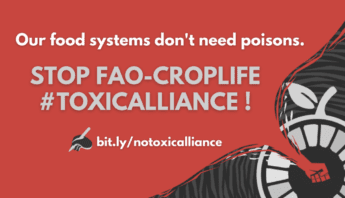Update: Just last week, EPA announced a ban on all food uses of chlorpyrifos! Though the decision is not perfect — and we’ll continue pressing for phaseout of all remaining, non-food uses of this dangerous chemical — this is a huge milestone that protects the health of millions of children, farmworkers and families. Next up, we’ll continue pushing for the EPA to do the right thing by following the science and standing up to corporate influence.
Update: Just last week, EPA announced a ban on all food uses of chlorpyrifos! Though the decision is not perfect — and we’ll continue pressing for phaseout of all remaining, non-food uses of this dangerous chemical — this is a huge milestone that protects the health of millions of children, farmworkers and families. Next up, we’ll continue pushing for the EPA to do the right thing by following the science and standing up to corporate influence.
Much as the chemical industry likes to complain about regulation, the fact is that the regulatory process in the U.S. is captured by corporate interests. As those of us who work on pesticide issues know well, industry’s influence at EPA’s Office of Pesticide Programs (OPP) is an extreme case in point.
I’ll never forget that elevator ride in the EPA headquarters building a few years back. I was in DC for some advocacy work with farmworker partners, a trip that had taken weeks of careful planning and was a stretch for our non-profit budgets.
One of the meetings we’d arranged was with the enforcement unit of OPP. Our goals were to discuss progress on implementation of the new Worker Protection Standards and to check in on the status of some especially harmful pesticides like paraquat, atrazine and the brain-harming insecticide chlorpyrifos.
The office director came to escort us up to the meeting room after we navigated ourselves through security. In a moment of cheerful, clumsy candor in the elevator, he said this: “It’s so nice to see you folks! We meet with the other side all the time!”
Unfettered industry access & influence
Yes. Yes they do. For years, we’ve been highlighting the outrageous access and influence pesticide corporations have at EPA. Alongside others in the movement, we’ve documented the agency’s behind-closed-door meetings with Syngenta about atrazine, Monsanto (now Bayer) about glyphosate, and Dow Agrosciences (now Corteva) about chlorpyrifos — all of which yielded gratifying results (e.g., years of continued profits) for these industry giants.
Clearly these “all the time!” sessions have been an effective way to keep toxic products on the market.
The resulting impacts on public health and the environment are staggering. Every year, millions of people across this country — especially children, farmworkers, farmers, and rural families – are exposed to hundreds of millions of pounds of pesticides that have been deemed unsafe and banned in other countries, but are still widely used here.
Administrator Regan, I know you’ve been busy and there’s a lot to do, but you need to get the pesticide industry out of the driver’s seat at OPP. Now.
Not convinced yet?
For anyone who’s not yet convinced this is a problem, a recent article in The Intercept from investigative reporter Sharon Lerner may sway you. Lerner interviewed dozens of current and former OPP staffers, and found an office culture so deeply enmeshed with the pesticide industry that the corporations are often calling the shots.
Lerner reported that scientists are regularly told to look the other way if they see problems with studies submitted by registrants (regulatory lingo for the corporations that want their products approved). In some cases, there are serious flaws — but if the staffer persists in raising concerns, they may be putting their career at risk. One toxicologist told Lerner there was an “unwritten rule that to get promotions, all pesticides need to pass.”
As The Intercept piece documents, this is exactly what happened with one of the core studies justifying use of chlorpyrifos decades ago. Generations of children and millions of workers have since been exposed to this neurotoxic chemical.
Just a few more of the many eye-opening tidbits from Lerner’s reporting:
- Since 1974, all of the OPP leaders who continued their careers after leaving EPA (seven out of seven) went on to make their money from the pesticide industry;
- In 2018, OPP celebrated (with cake!) when they reached the milestone of 1000 scientific study requirements waived;
- OPP staff are regularly treated to industry-sponsored farm tours and Ask a Farmer events, highlighting the “need” for pesticides that are under review.
A firewall, please.
Industry’s oversized influence at EPA is hardly a secret. They have resources to spend on regulatory lobbying, and they spend it — clearly it’s good bang for the buck. During the last administration this was particularly brazen, since there was no need to hide. After all, a former coal industry lobbyist was in charge.
Hundreds of brilliant, dedicated scientists and civil servants at EPA are no doubt deeply frustrated by the political pressures that keep them from doing their job. Indeed, many of them threw up their hands and left during the last administration. Those that remain need strong leadership from the top to transform the internal culture in ways that put a solid firewall between their decisions and industry pressure.
Fundamental change is required that centers EPA’s actual mission of “protecting public health and the environment,” rather than bowing to corporations. This shift is crucial to this administration’s official, government-wide goals to “limit exposure to dangerous chemicals and pesticides,” “reduce greenhouse gases” and “bolster resilience to climate change.”
That’s exactly why “reducing the influence of corporate lobbyists” was at the very top of the list of priorities we (and 22k PAN supporters) delivered to Administrator Regan back in March.
Time for strong leadership, Mr. Regan
When I worked at EPA headquarters many years ago, I learned there are two things that make decisions move quickly through layers of bureaucracy: a request from Congress (always in a yellow folder) and court ordered deadlines.
As we saw in Lerner’s piece, corporate lobbyists have learned the yellow folder lesson well. They can leverage their campaign gifts by asking members of Congress to “request” that EPA make their product a “yes package” that will sail through with waived study requirements and accelerated review.
Meanwhile, groups like PAN go to court to force EPA to do its job, a strategy that’s proven fairly effective — but is very, very slow. It was 2007 when we petitioned the agency to withdraw all uses of chlorpyrifos, already known back then to harm to children’s developing brains. Fourteen years and many court appeals later, EPA is now finally poised to get this chemical off the market (the August 20 court deadline is coming up, click here to urge them to get it right!).
But we really shouldn’t have to sue and send action alerts to force EPA to do its job. It’s a public agency, funded by our taxpayer dollars. They work for us.
Which is where that leadership opportunity comes in. This administration’s pesticide decisions have been deeply disappointing so far, and this isn’t likely to change until that firewall is in place, scientists are able to do their jobs, and the “yes package” culture is gone.
The stakes are high, Mr. Regan, and now’s the time. These corporations have had their way with your agency for much, much too long.








